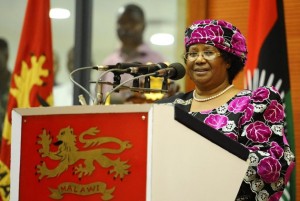 THE African continent welcomes the smooth power transfer in Malawi, which saw president Joyce Hilda Banda becoming Malawi and Southern Africa’s first woman Head of State and Government last Saturday. Sixty-two-year-old Banda succeeds the late President Bingu wa Mutharika who died last Thursday of cardiac arrest. Although Malawi is still in mourning, the region appreciates that the people of Malawi opted to follow the letter and spirit of their constitution, which stipulates that in the event of the death of the president, the vice president automatically takes over, until elections are held.
THE African continent welcomes the smooth power transfer in Malawi, which saw president Joyce Hilda Banda becoming Malawi and Southern Africa’s first woman Head of State and Government last Saturday. Sixty-two-year-old Banda succeeds the late President Bingu wa Mutharika who died last Thursday of cardiac arrest. Although Malawi is still in mourning, the region appreciates that the people of Malawi opted to follow the letter and spirit of their constitution, which stipulates that in the event of the death of the president, the vice president automatically takes over, until elections are held.
This was a refreshing development, which seems to be taking root on the continent. Last year, we witnessed a smooth power handover in Zambia, and the same happened in Senegal last month.
The political maturity being exhibited should see the region focusing attention on sustainable growth and development in an increasingly competitive economic environment.
The women of Africa and the Sadc region in particular salute the people of Malawi who have believed that a woman can rise to the highest policy decision-making level in the country.
Accepting that President Joyce Banda succeeds President wa Mutharika demonstrates the faith they had in her leadership and vast experience not only in the political arena, but also in business and other social and cultural sectors.
Becoming the Sadc region’s first woman president and Africa’s second after Liberian president Ellen Johnson-Sirleaf also brings a new dimension in the continent’s political power matrix.
What does this mean for women and the girl child’s future? Although women constitute 52 percent of the population, they still have to shatter many glass ceilings in key decision-making areas, politics included.
But, the good news now is that the girl child has another role model to emulate, someone who has achieved many firsts in her social and political careers.
As the world watches her every move, it is important that that same world understands and appreciates who Joyce Banda is, and what it took for her to become Malawi’s first vice president first, for she is a woman with an excellent resume, rooted in the women’s movement, fighting for gender equity and justice.
There must be something for a woman who started active politics in 1999, and has worked with Malawi’s second and third presidents after the republic’s first president, Dr Hastings Kamuzu Banda. She also has her predecessor to thank. Then Comesa secretary-general, the late President wa Mutharika in 1996 called on African governments to empower women saying, “There is need to push women to have their own economical survival . . . The decisions taken in Beijing will not materialise if women are not economically empowered”.
President wa Mutharika also surprised Malawians in 2009 when he appointed her as his presidential running mate, doing so at a time when she had already held the Gender, Child Welfare and Community Services cabinet portfolio in President Bakili Muluzi’s government.
Before her appointment as vice president, she had also been Malawi’s foreign affairs minister.
Apart from the experience, she is a strong-willed and battle-hardened leader, fighting battles on both the home and professional fronts.
In 1981 she walked out of an abusive marriage and argues that “most African women are taught to endure abusive marriages. They say endurance means a good wife but most women endure abusive relationships because they are not empowered economically, they depend on their husbands”.
Despite that, she credits the support and encouragement she gets from her second husband, retired Chief Justice Richard Banda.
When she fell out with the late president, she stood her constitutional ground and stayed on as vice president although she had been fired from the party. In the process, she formed her own party.
She has received a number of national and international accolades.
Her life is a lesson for both women and men, especially women who are beginning to see that the numbers are growing, and that the sky is the limit if you believe in yourself.
However, when all is said and done, President Banda has to lead Malawi — pick up the pieces from where her predecessor left.
There are so many expectations especially on the economic front since Malawi is facing many hardships after donor support was withdrawn last year.
Her success will come from working with what Malawi has, drawing support and encouragement from the people and regional leaders and women on the continent.
If donors restore aid, this should be on a short-term basis because Malawi has learnt how difficult it can be to have a national budget funded by donors. The transformation of Malawian society should in the long term not be based on donor funding.
We also hope that President Banda sticks to the commitment she made at her inauguration when she said there is no room for revenge.
We hope that that spirit pervades every section of Malawian society, especially the top leadership in her government in particular.
Every Malawian has something to contribute towards the country’s success, including President wa Mutharika’s family, party and allies.





No comments! Be the first commenter?